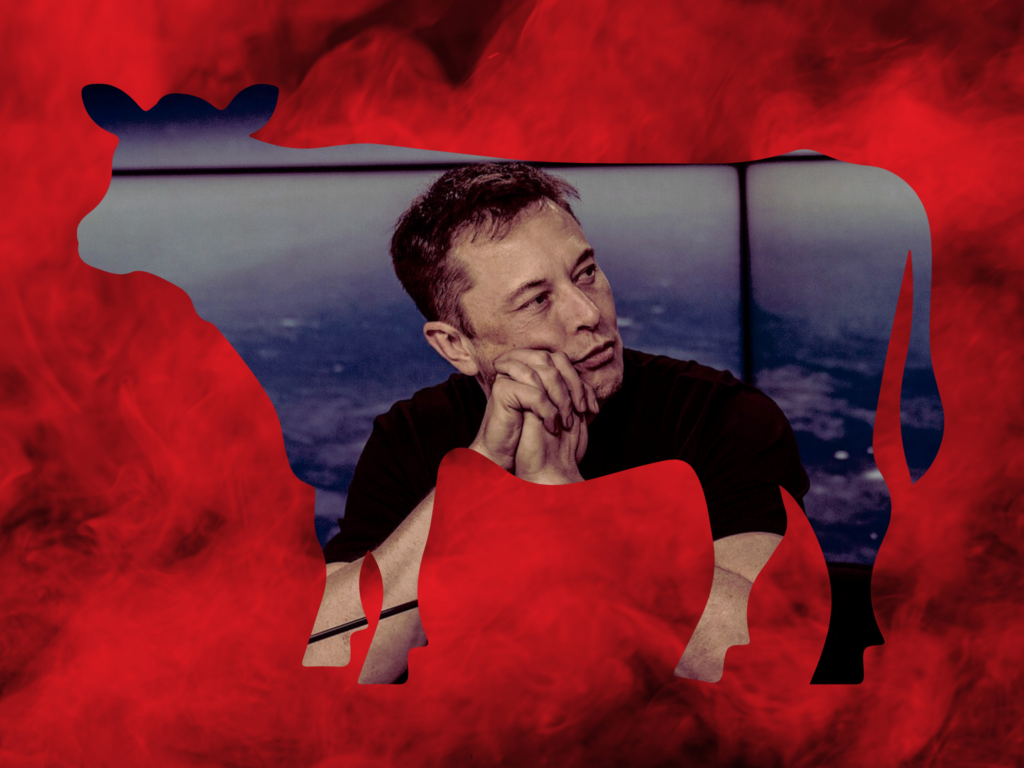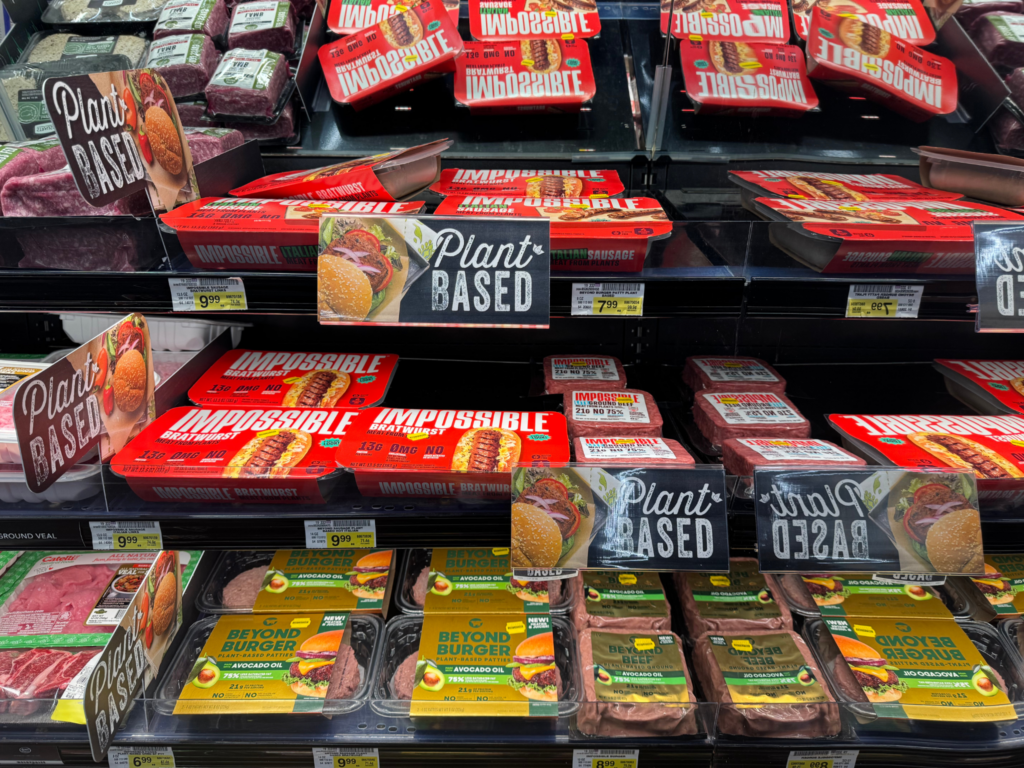
Americans’ appetite for meat is increasing, with sales reaching record highs in 2024 amid a cultural shift and changing political landscape. Here’s what’s going on.
Meat is back on American plates – at least if you look at the numbers.
Despite experts warning about the health and environmental impact of animal proteins, Americans spent more on meat last year than ever before.
Sales of meat hit $104.6B in 2024, according to research by the Meat Institute and trade group FMI – The Food Industry Association. The average American spent $870 on beef, pork, chicken and other meat products last year, and only 22% said they wanted to eat less meat (the lowest share in five years).
According to NielsenIQ, volume sales of meat increased by 4% in 2024, against a 2% decrease for plant-based alternatives. “Retailers are responding to this trend by limiting their offerings of plant-based meats and focusing more on their core meat products,” the market research agency said.
It’s a reversal of industry fortunes from five years ago, as the New York Times points out, when vegan products were replacing meat everywhere from shopping baskets to Michelin-starred restaurants. In the two years since the pandemic, meat consumption dropped by 4kg per person. By contrast, plant-based meat was attracting record investment, and sales were soaring too. Now, though, there’s an anti-vegan backlash.
Now, though, meat, from animals, not plant, is resurgent in the US, to the detriment of the planet. There are several possible reasons for this, from a shift in culture to a new political dawn.

Make America Eat Meat Again
The political changes that have drawn Americans back to meat are not partisan, though it’s hard to understate the influence of movements like Make America Great Again and Make America Healthy Again.
Fuelled by the return of President Donald Trump, a former (short-lived) steak entrepreneur, a renewed wave of Americana and right-wing influence has taken hold of American culture. Beef is cool again, as are attempts to ban companies from selling cultivated meat – so far, lawmakers in 20 states have brought forward such proposals, and three have been enacted into law.
The shift has been heralded by advocates of the carnivorous diet, who eat meat and practically nothing else, and encourage other Americans to do the same. Joe Rogan and Elon Musk – two of America’s most influential figures, on the public and on government, respectively – together championed beef on the former’s chart-topping podcast, and raised doubts over the scientifically established climate harms of animal agriculture.
Musk, the former environmentalist who turned into “dark MAGA” last year, has added information from a climate alarmism think tank on his Department of Government Efficiency website. He may be leaving government soon, but his influence and money will not.
Another former environmentalist, Robert F Kennedy Jr, is arguably one of the most prominent advocate of animal-based foods. Trump’s Health and Human Services secretary has brought his vaccine scepticism to seed oils and processed foods too.
It was only last month when he appeared at a Steak ’n Shake location in Florida to praise its switch from seed oils – which he says causes illnesses, despite evidence to the contrary – to beef tallow, which went out of fashion decades ago because of its high saturated fat content, a leading cause of heart disease that kills one American every 33 seconds.

The bipartisan backlash to ultra-processed foods
The seed oil backlash isn’t just restricted to the right. Americans across the political spectrum have raised concerns about these oils, as conflicting studies shroud these fats in mystery and confusion. This is despite a recent Harvard University study suggesting that a switch from animal fats to plant-based seed oils can actually lower the risk of death by 17%.
This highlights the divisive nature of RFK Jr. While he is an anti-vaxxer who has peddled outrageous theories over the years, many on the left agree with some of his positions.
RFK Jr has been highly critical of factory farming – and rightly so. His solution is to scale up regenerative agriculture, echoing the thoughts of many crop and livestock farmers and experts who champion its benefits on soil and nature. However, the regenerative agriculture movement suffers from a lack of standards and definitions, and climate activists argue that this has allowed meat and dairy companies to exploit it as a greenwashing tool.
The other issue where Kennedy likely finds support from the other side of the aisle is processing. He has criticised ultra-processed foods (UPFs) as a cause of America’s obesity epidemic, and promised to ban them from schools. An example of the cross-party support for this cause comes from California, whose Democratic governor, Gavin Newsom, is investigating how to crack down on UPFs.
Plant-based meat has been caught in the crossfire. For many Americans, these products feel unnatural, with long ingredient lists and over-processing (though as many nutritionists point out, processing isn’t directly linked to nutrition). This has likely contributed to the slowdown in sales of meat alternatives.
On the other hand, more ‘natural’ (read: grass-fed or regeneratively farmed) meats – and raw milk – are now being heralded as the anti-UPF solution.

Corporate influence shapes America’s meat culture
The cultural shift has also been brought about by massive marketing campaigns by Big Meat, many of which seek to discredit the science proving the climate harms of livestock farming, and instead sow doubt on the environmental credentials of plant-based meat.
Lobbyists for the meat industry swamped COP29, the world’s largest climate conference, in the hundreds, as they sought to influence talks around agricultural reforms.
And if you needed any proof of the sector’s plans to influence policy, look no further than JBS. The world’s largest meat company, whose IPO has been delayed amid backlash from activists and politicians, was the single largest donor to Trump’s inauguration. The company contributed a $5M sum via its Pilgrim’s Pride division, dwarfing the much-publicised contributions of tech giants like Meta, Amazon, and OpenAI.
All this comes amid alarming climate denialism in the US. Trump is a long-time sceptic, but nearly a quarter of Republicans in the last Congress were identified as climate change deniers too. Public polls show that 15–25% of Americans are doubtful of the existence of the climate crisis, despite hurricanes and wildfires swarming the country.
A recent survey by Gallup found that only 14% of Republicans find climate change to be a “serious threat”, and this year, those who believe its effects have already started are fewer than last year. In fact, nearly eight in 10 Americans who vote red think the media exaggerates the impact of climate change.
This coincides with a shift away from ESG and DEI policies at a corporate level. They’re now out of favour, thanks in large part to Trump, who has likened these measures to “wokeism”, a tag that has also negatively affected meat alternatives.
Where the anti-woke, UPF-averse, pro-meat movement goes next remains to be seen. Will it sustain its momentum, or will Americans turn back to plants? A lot rests on the Trump era, and its aura.
The post Beef, Beliefs & Billionaires: Why Meat Is Booming Again in America appeared first on Green Queen.
This post was originally published on Green Queen.